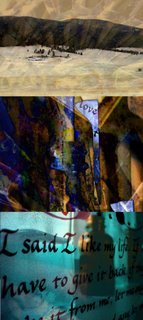Our Metaphorical Brains
Synesthesia (also spelled synaesthesia) occurs much more frequently in artists, poets and novelists than it does in the general population.  Yesterday I wrote about Jason Moran and his approach to jazz composition. I started writing about the idea of synesthaesia -- I admit it's a bit of a stretch to jump from Moran's jazz style and artistic influences to the peculiar ability some people have to see colored numbers or colored days of the week ... but hang with me here a minute and hopefully I'll stimulate your modalities to start thinking in synesthetic-like ways.
Yesterday I wrote about Jason Moran and his approach to jazz composition. I started writing about the idea of synesthaesia -- I admit it's a bit of a stretch to jump from Moran's jazz style and artistic influences to the peculiar ability some people have to see colored numbers or colored days of the week ... but hang with me here a minute and hopefully I'll stimulate your modalities to start thinking in synesthetic-like ways.
Synesthesia: A condition in which a person quite literally tastes a shape or sees a color in a sound. This is not just a way of describing experiences as a poet might use metaphors. Synesthetes actually experience the sensations.
From the Wikipedia article on synesthesia:
While cross-sensory metaphors are sometimes described as 'synesthetic,' true neurological synesthesia is involuntary...
My point is not whether non-synesthetes are successful or not, in capturing the essence of synesthesia. For me, trying to simulate synesthesia might open a crack in the door to a deeper level of metaphorical thinking ... a richer way to see and experience the world around me, or just another way to intentionally stimulate parts of my brain to cross wire or cross-pollinate.
Just for fun, listen to/watch this software-generated simulation of a quasi-synesthetic song-round. Click on the center arrow:
When I watch all four voices in the animation above, slightly squinting my eyes at it, I can see dancers moving around in the space, interacting with each other, interweaving the melodies in a very physical way. It occurs to me music animation such as this, might be an effective way to teach music.
More links:
Museum of the Mind, a web portal for synesthesia. There is almost too much to take in, at that website, but for starters, if you are an artist or poet, you might be interested in Dr. Hugo Heyrman's fascinating lecture on Art and Synesthesia.
One last reference on synesthesia as it relates to artistic endeavors is this, from the Contemporary Aesthetics, a paper titled, Kinetic Synaesthesia: Experiencing Dance in Multimedia Scenographies


7 comments:
Fascinating!!!
wonder if it is possible to develop synesthaesia if one has a small dollop....
I think we could try to cultivate an ability like synesthesia, intentionally crosswiring our senses, but I don't know about acutally being able to develop synesthaesia, Endment.
p.s. are you having trouble with the beta blogger transition? any trouble with commenting on the blogs you usually read?
With people who havent switch to beta..commenting is hard, so hard I've resorted to an alias..and then reference to myself...I thought this was supposed to PROGRESS!! oh well,..I loved this entry. and the video snippet. Soo dang cool!!!
wendy, thanks for being so persistent and going to all that trouble so you could comment. I am SO frustrated, too, with the beta blogger. It's just a pain in the neck!
I love that little video/animation too -- i've played it a bunch of times trying to learn the round, lol.
Maureen, you have no idea HOW MUCH I LOVE this! I have sent it to all my sons, who I know will love it also! Thank you so much.
I have not signed onto Blogger Beta yet, but I understand that we will all have to. I'm hoping they get the bugs worked out soon. Or late.
ps the great Russian dancer Nijinski had synesthaesia. I had a good friend who wrote a book of poetry based on his life -- an excellent book, too, tho' never published. But he was nuts. I tend to think many poets and artists must have this to a degree, as well as a little schizophrenia....
Pepek, there have been studies that show there is a higher percentage of synesthetes in the population of poets, novelists, visual artists ... and I bet the same would be true of dancers, musicians ... maybe even engineers [grinning at all engineers who may read this]
yeah - bummer about beta's problems. unfortunately i switched before I looked into it very deeply and I'm now in beta. haven't had time to tweak my switched-over blogs to take advantage of all the COOL new features and in the meantime, it's a pain in the neck - signing in and commenting are both problematic.
Post a Comment